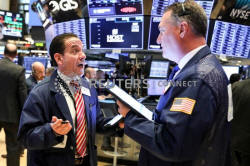Wall St. eyes return to record highs as stocks cheer trade reprieve
 Send a link to a friend
Send a link to a friend
 [July 01, 2019] By
Marc Jones [July 01, 2019] By
Marc Jones
LONDON (Reuters) - Stocks rallied and bonds
retreated on Monday as the United States and China agreed to restart
trade talks, leading investors to cut back wagers on aggressive policy
easing by the major central banks.
The dollar gained against the safe-haven yen as Treasury yields rose and
futures reined in bets for a half-point rate cut from the U.S. Federal
Reserve this month.
"It (Trump-Xi G20 meeting) played out as well as possible," said Hans
Peterson, SEB Investment Management's global head of asset allocation.
"So it gives us time to digest and get a bit better activity in the
global economy."
The United States and China agreed on Saturday to resume trade
negotiations after President Donald Trump offered concessions to his
Chinese counterpart Xi Jinping when the two met at the sidelines of the
G20 summit in Japan.
Those included no new tariffs and an easing of restrictions on tech
company Huawei [HWT.UL]. China agreed to make unspecified new purchases
of U.S. farm products and return to the negotiating table.

The initial reaction was one of relief that at least new tariffs were
avoided.
Europe's STOXX 600 climbed 1% and Japan's Nikkei <.N225> 2.1% to hit
two-month highs. MSCI's broadest global index <.MIWD00000PUS> added
0.3%, having just missed its best first half to a year.
Chinese blue chips <.CSI300> jumped 2.6% to their highest since late
April and Germany's export-heavy DAX <.GDAXI> gained 1.5% to its highest
since August. The Huawei hiatus and M&A activity pushed Europe's tech
sector <.SX8P> to a one-year peak. [.EU]
Wall Street was looking on course to return to record highs with S&P 500
<ESc1> and Nasdaq <NQc1> futures up 1.1% and 1.7%.[.N] In the bond
market, though, Treasury futures <TYc1> dipped as yields on 10-year
notes <US10YT=RR> edged up to 2.02%. [GVD/EUR
Fed funds <0#FF:> dropped over five ticks as the market scaled back the
probability of a half-point rate cut this month to around 15%, from
nearer 50% a week ago. <FEDWATCH>
Central bank umbrella group, the Bank for International Settlements, had
urged top central banks at the weekend to preserve their ammunition
rather than deplete it chasing higher growth.
"I think the Fed expectations in the market are very aggressive.
Possibly a bit too aggressive," SEB's Peterson said.
(Graphic: Global markets in H1 - https://tmsnrt.rs/2FEK8yw)
DAMAGE DONE
No deadline was set for a trade deal at the weekend G20 summit, however,
and much damage has already been done. Two surveys of Chinese
manufacturing showed activity contracting.
[to top of second column] |

Traders work on the
floor at the New York Stock Exchange (NYSE) in New York, U.S., June
17, 2019. REUTERS/Brendan McDermid/File Photo

The official Purchasing Managers' Index (PMI) held at 49.4 in June, just missing
forecasts, while the Caixin/Markit PMI dropped to 49.4, the worst reading since
January.
Surveys from Japan and South Korea showed similar slowdowns. So did the reading
for the euro zone, which contracted for a fifth month running and at a faster
pace than previously expected.
"Euro zone manufacturing remained stuck firmly in a steep downturn in June,
continuing to contract at one of the steepest rates seen for over six years,"
said Chris Williamson, chief business economist at IHS Markit.
There were some unusual issues, too. South Korea <.KS11> lagged, in part as
Japan tightened restrictions on exports of high-tech materials in response to a
South Korean ruling on war-time forced labour.
European Union leaders were struggling to agree on who will take over the EU's
top jobs. Swiss stocks seemed unfazed that they had been barred from EU
exchanges amid a row between Brussels and Bern.
The post-G20 cheer dominated, though. In currency markets, safe havens like the
yen and Swiss franc gave up some recent gains. The dollar rose 0.4% on the yen
to 108.26 <JPY=> and 0.7% on the franc to 0.9830 <CHF=>. [/FRX]
The dollar added 0.4% on a basket of currencies to 96.531 <.DXY>. The euro eased
to $1.1350 <EUR=>. The dollar went the other way on the Chinese yuan, dipping
0.4% to 6.8403 <CNY=>.
The dollar's gains hurt gold, which fell 1.5% to $1,388 per ounce <XAU=>
Industrial metals did better. Copper scored a six-week high and oil prices rose
as OPEC and its allies looked set to extend supply cuts at least until the end
of 2019. Iraq joined top producers Saudi Arabia and Russia in endorsing the
policy. [O/R]
Brent crude <LCOc1> futures rose $1.55, or 2.4%, to $66.31 a barrel. U.S. crude
<CLc1> gained $1.35, or 2.3%, to $59.82.

(Graphic: Asia stock markets - https://tmsnrt.rs/2zpUAr4)
(Graphic: Asia-Pacific valuations - https://tmsnrt.rs/2Dr2BQA)
(Additional reporting by Wayne Cole in Sydney, editing by Larry King)
[© 2019 Thomson Reuters. All rights
reserved.] Copyright 2019 Reuters. All rights reserved. This material may not be published,
broadcast, rewritten or redistributed.
Thompson Reuters is solely responsible for this content. |